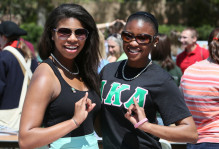Welcome to the Frontlines of the Battle Against Poverty
Those are the words used to welcome my group of W&M students from W&M’s DC Summer Institute to DC Central Kitchen. A week later, I am participating in the battle against poverty via my new internship as a Program Assistant for DCCK’s Culinary Job Training program. C.J.T. is a 14 week program which gives the unemployed, recently incarcerated, the homeless, and other people who face employment challenges culinary job training and other skills so that they may secure gainful employment. During the tour, our host, the Director of Development (Fundraising) spouts off a lot of numbers:
It costs approximately $40,000/year to imprison someone. The national recidivism rate, the rate at which people who are released from jail get arrested again, is about 68% over three years. The recidivism rate of DCCK’s Culinary Job Training program? A mere 2%. Program cost is $10,000 per student, and 90%+ of students secure employment after graduation. Many graduates work for DCCK after graduation earning full benefits and a living wage of $13+ per hour.
My first week has come to an end. It began with the standard introductory type material and activities, but I quickly gained a set of projects to work on during the second half of my first day. Within the organization, I work almost exclusively with a team of seven other employees in the Culinary Job Training “Division.” Everyone on my team is interesting, helpful, and is skilled in their role. On the team are two culinary instructors, including one who gained fame as winner of a Gordon Ramsay reality cooking show, a social worker, an outreach specialist, an employment specialist, an empowerment therapist/mentor, a recruiter/administrator, our director, and myself.
What I’ve learned working four days in non-profit is that we operate just like any other business – there are superiors and stakeholders to report to and make the strategic decisions that guide the organization; there are same weekly status type meetings, there are the same organizational divisions (management, operations, production, development, etc.); there are the same constraints of cost, strategy, board approval, meeting targets/quotas, etc. which guide management’s actions. What’s the difference then? The mission.
A private company is concerned with making profit by selling something. We distribute prepared meals to homeless shelters, schools, and other organizations – we feed people and kids. We run a program to help give people who others have deemed failures a second chance at life. We provide fresh produce to corner stores in food desserts. We run Campus Kitchens, in which the DCCK model of converting donated and “recycled” food into sustenance is replicated across several college campuses. DCCK uses food as a tool to improve people’s lives. Through some innovative strategy, they started a catering business and developed contracts to provide food to local schools. These operations fund over 60% of our costs. We are a good definition of social entrepreneurship. Our work changes lives in a meaningful way.
Wal-Mart might save you a little money compared to other retailers. Exxon might provide the fuel you need to get to work. Samsung & Apple might provide hours of entertainment and convenience in your daily life (then sue each other over rounded corners). But, the existence of a company like DC Central Kitchen is nigh irreplaceable, whereas, in my opinion, if Wal-Mart, Exxon, Apple, or Samsung went out of business, six months later you would be just as satisfied with the product of one of their competitors.
DCCK’s mission matters, and it’s something an employee is connected to immediately just by the way the space is set up. Due to space constraints, many of the business-end offices are located in the same facility as the production (where the food is prepared). You have to walk through gobs of volunteers, who donate their time/work to help DCCK achieve their mission, just to get to your office in the day. Everyone that I have talked to has a background that ties them to the people we are trying to help at a personal level, where the heart rules, not on a business level. Although I’ve only been here for four days, I can tell that the people on my team are genuinely concerned with each person’s success. They all know each student’s name and background. They are emotionally invested in their growth and success. Try finding that in any other company. It actually reminds me of some of my favorite professors at William & Mary. Considering the background that many of the program entrants face, I believe this type of relationship and investment by the employees into the students is a key factor in the success of the program and the students.
My boss gives me great autonomy. On my second day of the job, I only spoke with her a few times as I was busy working on projects that had been assigned to me on my first day. One of those was a statistical analysis which 4 or 5 other people had worked on in the past. The work was inconsistent with no continuity and questionable objectives. I fixed those things and provided a platform that would enable automatic statistical calculation and graphing with clear instructions on how it worked and how to use it. This impressed the boss so much she showed it to a higher up. He later came to tell me “well done” and hoped I had time to work on other projects for the organization.
On my first day I was invited to happy hour by a co-worker who had spoken to me a total of five minutes. One has made a particular effort to show me the ropes and get to know me. Another who I work in the same shared space with for most of the day regularly engages in conversation. On Friday, one of my co-workers took the time to thank me for the work I had already done in my short time there.
The work culture is very amicable, open, and mission-focused. The leadership style of my boss is one with great autonomy, sincere support, and a direct communicator. I think the small team size works well given the current scale of the job training program with specialists making up most of the roster. One guy has only been working there for a month, but it’s like he has been a part of the crew since day one. I don’t think that would be the case with a bigger team or different culture. From the leaders we spoke with during LCE, I think my boss is most like Colin from Acceliprise due to the high autonomy and focusing on the composition of the team, but I imagine our work culture is more like the one that Michael Powell described.
Questions: What is the culture like at your internship? What type of leadership styles do you see being employed? Are they effective? Do you work with a large group of people or on a smaller team like me? Is a small or large team better and why?
Comments are currently closed. Comments are closed on all posts older than one year, and for those in our archive.




Daniel! Hi! I saw you very quickly today and got to say hi, but I am wondering where you were off to in such a hurry.
It sounds like you are really enjoying your internship, which makes me so happy to hear! It is so great that you have already proved you are a great asset to the DCCK and that you really love the environment. My non-profit is actually really really really tiny. In the office we have three legal fellows (all new as of last week) and two interns (all new as of last week) and our supervisor, who is also the executive director, is in and out of the office. So I am basically working with four other people and for the most part we are all working on separate projects. It is a bit lonely, but I have started to really enjoy my work. Last week I did not have an substantive work, but I have my first project this week! I am researching potential funders for ConSource and going to classes at the Foundation Center (FOR FREE!) to learn how to write grants, seek out funders, approach them, etc. Obviously since our executive director is only sometimes in the office there is hardly any oversight. Julie really expects us to get our work done on our own. This is really nice, but because I am taking on something I do not know much about sometimes I wish I could have a little more instruction. I hope you are doing well. What a great post 🙂
Hey Daniel! I am glad that everything is going so well at DCCK. I was very impressed by the organization for the brief time that LCE was able to visit them. It sounds like you are working with a very diverse group of employees which will undoubtedly be a phenomenal experience. Out of all of our visits, DCCK made their mission very clear. I believe that keeping your mission in mind every day and at the forefront of your work is essential to the success of an organization. Your discussion of each employees’ emotional investment is an incredible concept and something that speaks very highly of the employees at DCCK. At my office, our mission is discussed at least once everyday, so I definitely appreciate a goal focused work environment. It must be exciting to have energy and the movement of volunteers around you on a regular basis. My office does not get to see the actual work that we are doing as most deals with correspondence with Congressmen/women. I work with four other employees, all of whom I cannot speak more highly of. They are professional and also fun to be around. I usually like work environments where I get to interact with a lot of people so this summer is a great experience to buckle down and see work from a less hands on perspective. It also great to know that our work definitely makes a big impact. I really enjoyed your post. Hopefully I will see you at the mentor dinner tonight!
Hey Daniel! I am so glad that you have the opportunity to work at DCCK. After our site visit, I was so impressed by the organization. I have helped with Campus Kitchens before, but I had no idea that it was part of a larger mission. You touch on this in your post, but what struck me the most is how self-sustaining the program is. I really admire how DCCK aims to fix problems by teaching skills rather than just providing meals to ease problems. Today was my first day… but so far, the culture at my internship has been great! There are five of us in the office (since the Aspen Institute is split into branches, our office is pretty self-sufficient/), not counting the two traveling directors. Personally, I think a smaller team is better. It allows for more communication and connections among the team members. I look forward to hearing about people’s experiences with larger teams though, I might change my mind.
Hey Sarah! Thanks! I would have stopped to chat w/ y’all, but I was late meeting Jesse. We were doing some bromance roommate bonding by watching the new X-Men movie at the Regal in Chinatown. Next time, I’ll send out a LCE message when we go.
We have the same type of Director in terms of autonomy. There are some not so good things about it like needing a little direction when you are doing something for the first time. I don’t know you well, but from what I have seen you are eager to learn and driven to do well. Combine that with the classes and a little time with your supervisor, and I’m positive you will do a good job with your project.
Stay in touch!
Mark, thanks and amen my brother. The other interns at DCCK didn’t start until this Monday, so I spent most of the day going through the formal Intern Orientation, which included a nearly two hour discussion with the CEO of DCCK w/ just four interns. He took us through the whole history and really conveyed the philosophy of the organization better than anything I could have done on my own. The innovation and people at DCCK have made us a success, but it’s really the philosophy of the mission that drives the organization.
I also really believe in strong relationships with co-workers. You get more work done and work more effectively when you have that camaraderie and team-like investment into each other. I don’t have many friends, but some of my greatest friends have come out of work relationships.
I didn’t get to talk with any of us LCErs at the mentor dinner tonight. My mentor is really cool and we ended up talking the whole two hours. I hope everyone else had a good experience with their mentor tonight too.
I’m more a person of action due to impatience and the need to see direct results, so I’ll be curious to hear your thoughts on not having that connection at summer’s end. Best of luck with the remainder of your internship!
AMANDA, 🙂
I knew I had made a good decision to intern with DCCK, but hearing Alex explain it during our hot visit just reinforced the fact that I had made a good decision. I’m glad you’re getting a good initial impression from your internship.
I don’t think I told you this, but Aspen Institute was also on my short list of internships. They do great research, and I like the concept of a think-tank that is trying to solve big problems on a big scale. I would love to hear more about you experience there over the course of the summer.
In business school, we are required to take a course in psychology applied to the organizational dimension, called organizational behavior. One of the interesting things studied is ideal team size. A large team is generally better for generating ideas in a non-traditional brainstorming manner. Human creativity is an amazing thing, so more minds = more diversity and more creative solutions. Obviously, it’s also good for huge projects like landing on the moon.
For most tasks and environment, a small team is best for the reasons you stated. Better communication, easier collaboration, and stronger bonds amongst teammates. We all are on small work teams for our internships, I think, but hopefully you get to see the difference yourselves in a big company meeting or something like that.
Looking forward to hearing more about your Aspen experience!